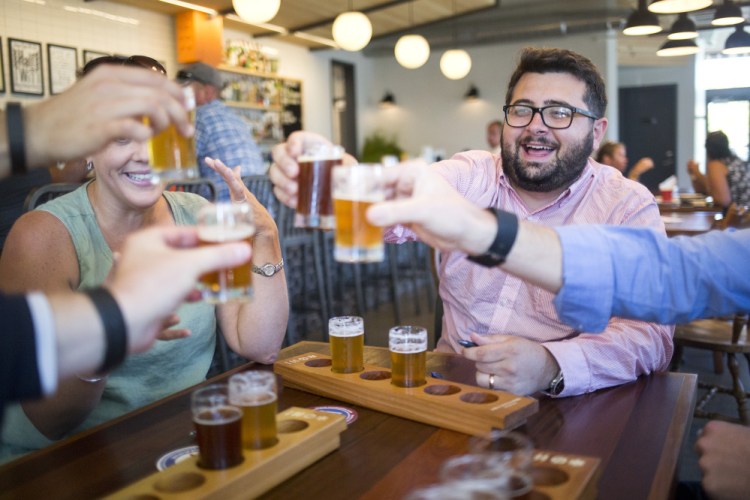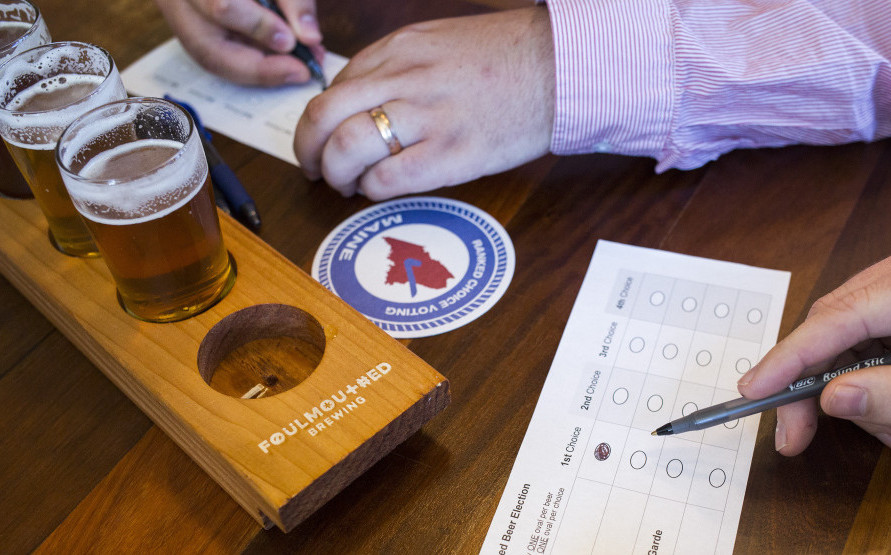SOUTH PORTLAND — All four varieties of frothy craft beer set out in tasting glasses Tuesday at a table at Foulmouthed Brewing looked good to Jill Ward.
After she and four others carefully tasted the brews, the ranked-choice voting demonstration began.
Ward gave her first place vote to Brat, a “German style session ale … with a noble hop finish,” according to the menu description. Her second choice was Rhubarb De Garde, a “strong amber French-style farmhouse aged on rhubarb for a tart earthy punch.” Her third- and fourth-place votes went to Kaizen and Tri Force IPA.
“The Rhubarb had a unique taste, but the Brat went down smooth and easy, and that’s what I like in a beer. I’ll come back for that one,” said Ward, president of the League of Women Voters of Maine.
The Brat won a clear majority on the first ballot with three votes. Had Brat not received a majority, the voting would have continued under a system that Maine voters could enact in November for gubernatorial, congressional and legislative elections.
Tuesday’s media demonstration was conducted by the Committee for Ranked Choice Voting. The committee will hold demonstrations for the public at 19 breweries across Maine in September as it stumps for passage of the November ballot question that could make Maine the first state to enact ranked-choice voting for state races. The League of Women Voters also supports ranked-choice voting.
Dubbed “Beer Election. Raise Your Glass and Rank Your Choices,” it’s the campaign edition of the brewery crawl. Participating breweries include Rising Tide Brewing, Austin Street, Foundation and Geary’s in Portland, as well as breweries in Farmington, Brewer, Biddeford, Newcastle and Skowhegan, among others.
Ranked choice, otherwise known as instant runoff voting, has been adopted for some municipal elections, including in Portland, which first used the system to elect its mayor in 2011.
Under ranked-choice voting, voters rank candidates in order of preference. If no candidate gets more than 50 percent of the top votes cast after the first tally, the candidate with the fewest votes is eliminated. Voters who chose the eliminated candidate have their ballots added to the totals of their second-ranked candidate and the ballots are retabulated. This process continues until one candidate has a majority of votes and is declared the winner.
Kyle Bailey, campaign manager for the Ranked Choice Committee, said the demonstrations will show voters that ranked-choice voting is easy to understand.
“It’s just a fun way to demonstrate how ranked-choice voting works,” Bailey said. “Once you try it, you realize how intuitive it is.”
Bailey said ranked choice gives candidates incentives to be more civil to one another, because if a candidate can’t win someone’s first-place vote, they might still win an election based on the number of second- and third-choice votes they receive.
“It can completely change the dynamic of campaigns,” Bailey said. “It becomes counterproductive to run negative advertising. You’re trying to build more of a consensus. You can’t just rely on your base to win.”
Even if it wins in November, ranked choice may have to survive a constitutional challenge – Attorney General Janet Mills wrote an opinion this spring saying it might be unconstitutional in Maine.
Bailey said he believes ranked choice would survive legal challenges, because state law says the candidate with a plurality wins the election, and ranked choice does not prevent a candidate from winning by plurality.
Races for governor can have more than two candidates, and the winner often ends up with less than 50 percent of the vote. Voters twice elected Gov. Paul LePage with less than a clear majority.
Gordon Weil, a former state official, is a vocal opponent of ranked-choice voting, calling it undemocratic because it allows a candidate to win a plurality of first-place votes but still lose an election.
“I’m all for doing ranked choice for beer,” Weil said. “If it ain’t broke, don’t fix it. This is not the Academy Awards or some game show, but who’s going to be our next governor.”
Craig Dilger, owner of Foulmouthed Brewing, suggested comparing ranked-choice voting and the traditional system at the brewery and seeing which one people like better.
“For the sake of science,” Dilger said, smiling.
A poll by the Maine People’s Resource Center in April said 58 percent of those surveyed were in favor of ranked-choice voting.
To learn more about the Beer Election, go to www.rcvmaine.com/beerelection.
Copy the Story Link
Send questions/comments to the editors.





Success. Please wait for the page to reload. If the page does not reload within 5 seconds, please refresh the page.
Enter your email and password to access comments.
Hi, to comment on stories you must . This profile is in addition to your subscription and website login.
Already have a commenting profile? .
Invalid username/password.
Please check your email to confirm and complete your registration.
Only subscribers are eligible to post comments. Please subscribe or login first for digital access. Here’s why.
Use the form below to reset your password. When you've submitted your account email, we will send an email with a reset code.